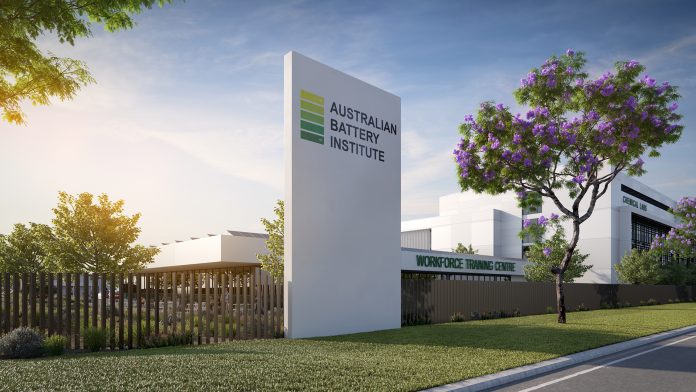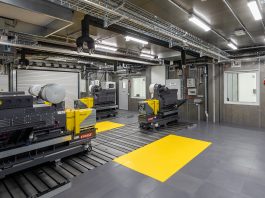Shannon O’Rourke, CEO of FBICRC, shines a light on Australia’s abundance of battery raw materials and argues for the need to adopt a growth strategy for battery manufacturing that offers a significant economic prize for the country.
The Future Battery Industries Cooperative Research Centre (FBICRC) was established in 2019 through the Australian Government’s Cooperative Research Centre Program.
We bring together 70 participants across 15 research projects and are the largest partnership of industry, government and researchers focused on battery industries in Australia. Our projects are valued at AU$120m and span the value chain from mining through to processing, manufacture, services and recycling and reuse of batteries.
Our aim is to capture the significant economic opportunities for Australia from the growing battery industry and address the challenges associated with the energy transition.
We are at a key transition point in our development, having reached halfway of our six-year lifespan. Through the continued support of our government, industry, and research partners, we believe that the work of the FBICRC can help to drive economic growth by leveraging greater value from Australia’s resources, technologies, innovation, and expertise at a time when demand for batteries is expected to grow nine-fold over the next decade.
Our vision for a vibrant and diversified Australian battery industry is articulated in our recently released blueprint for action titled ‘Towards 2030 – Australia’s Battery Powered Future’. We believe that visionary policy settings that are underpinned by mechanisms to drive consumption will be essential if Australia is to secure our share of the significant economic prize on offer.
Australia’s ambition to process more critical materials for precursor cathode manufacturing
Batteries and battery minerals are becoming increasingly critical to the global goal of achieving net zero. Australia is blessed with an abundance of raw materials and finite resources of global strategic importance that we should leverage to our national advantage.
All of our major international trading partners already have national battery strategies in place that either seek to buy the minerals from the mine or desire to buy the mine itself. If all players are executing the same strategy, then no one wins. Australia needs to differentiate itself from the rest, and we could feasibly do that through chemical manufacture, advanced materials, cells and modules for integration into the global value chains. This approach would allow us to compete in the parts of the value chain that hold most of the value creation and macroeconomic opportunity.
One of the FBICRC’s flagship investments is in the ‘Cathode Precursor Production Pilot Program’ based in Western Australia, which brings together a consortium of leading local, national and international companies, the WA Government, contractors and academic institutions with a project value of AU$18m.
The pilot plant project is an essential step in providing technical capability towards producing advanced battery materials on an industrial scale in WA and will produce the present generation of cathode chemistries used in electric vehicles from locally sourced materials.
The pilot plant extends the work of several Australian research institutions and companies which can currently produce battery minerals in pilot sized batches. It will produce the precursor suitable for material qualification in EV value chains and build on the downstream opportunities created by the battery-grade chemical refineries being commissioned or constructed in WA.
The ‘Future Charge: Building Australia’s Battery’ report
The FBICRC commissioned the Future Charge Report, released in June 2021, which identified that Australia’s current battery industry contributes an estimated AU$1.3bn to our GDP and 6,000 jobs, almost all of which comes from mining raw materials.
By 2050, it is estimated that batteries will account for 70% of all renewable energy expenditure.
The Future Charge Report clearly identified that almost twice the economic gains could be achieved if Australia diversifies into downstream segments, including active materials and battery manufacturing, in addition to mining activities.
We absolutely believe that there is a role for Australia to play a competitive role in the battery manufacturing industry and capture more of the value and a larger share of global battery value chains.
Our critical minerals endowment, emerging materials and manufacturing capabilities, global strategic partnerships and reputation as a low-risk investment destination makes Australia uniquely positioned to play a leading role in the worldwide battery technology revolution.
Australia is already a world leader in battery manufacturing through its dominant position in mineral supply. We aim to build a presence further downstream and share the value that the battery opportunity has to offer. Australia could create more than five times the value and jobs by pursuing this diversified battery industry path.
As the world moves towards decarbonisation, Australia has a clear choice to make. We can continue our traditional focus on mining and exporting raw battery materials and accept the lost opportunity of added value for Australia. Alternatively, we can adopt a growth strategy that offers a significant economic prize of AU$7.4bn annually and more than 34,000 jobs by 2030. Pursuing growth will require a shift in mindset, a need to invest with purpose and underpinned by courageous and visionary policy settings.
Shannon O’Rourke
CEO
Future Battery Industries Cooperative Research Centre (FBICRC)
admin@fbicrc.com.au
https://fbicrc.com.au/
https://www.linkedin.com/company/future-battery-industries-cooperative-research-centre/
https://twitter.com/FBICRC
Please note, this article will also appear in the ninth edition of our quarterly publication.









